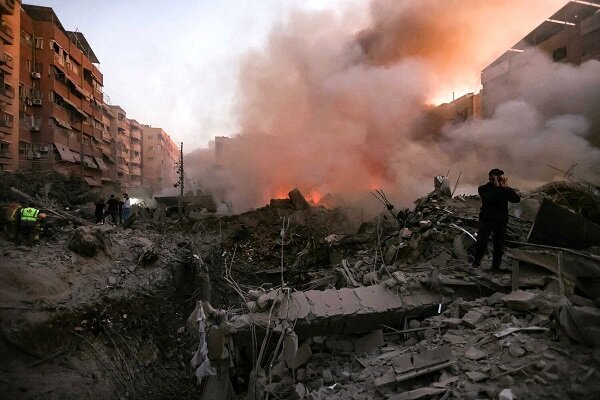Repeated Ceasefire Violations: What Is Lebanon’s Strategy Against Zionist Attacks?

webangah News agency – Nearly seven months after the ceasefire agreement in the “northern front,” the Zionist regime has violated this truce hundreds of times, assassinating Lebanese resistance field commanders and striking vital facilities such as weapons manufacturing centers or arms depots. The latest Israeli airstrike on beirut’s southern suburbs, despite drawing sharp condemnation from Lebanon’s army chief, failed to provide a convincing response to Lebanese public opinion.
While Tel Aviv continues violating the ceasefire-disregarding both the presence of monitoring committees across Lebanon and Beirut’s adherence to the agreement-the voices calling for independence and resistance grow louder.Despite Israel’s attempts to undermine the Hezbollah-Amal coalition in recent municipal elections, voters delivered a clear message: provided that occupiers remain in southern Lebanon, resistance ideology will retain strong support among residents of “the Bride of the Middle East.” This analysis examines Israel’s latest aggression against Lebanon and its implications for regional resistance movements.
Crossing Red Lines
On Thursday evening, June 5, 2025, Israel’s air force violated international law by breaching Lebanese sovereignty to strike alleged Hezbollah drone production and storage sites in Beirut’s southern suburbs (Dahieh) and Ain Qana. The Israeli military later claimed it targeted Hezbollah’s Unit 127-responsible for launching over 1,000 drones at strategic locations within occupied territories as Operation Al-Aqsa Storm began.
Experts argue these repeated attacks aim to delay or disrupt Hezbollah’s military reconstruction efforts across Lebanon. Additionally, following the decisive victory of pro-resistance factions in municipal elections (Progress & Loyalty list), Israel appears intent on fracturing Beirut’s political landscape by portraying Hezbollah as vulnerable among rival parties. Yet this strategy ignores recent demonstrations that Hezbollah retains meaningful operational resilience despite losses.
A Violation Before International Law
Lebanese President Joseph Aoun condemned israel’s latest incursion as an “explicit breach” of both international law and November 2024 ceasefire agreements. He emphasized that such actions reveal Tel Aviv lacks genuine commitment toward regional stability or equitable conflict resolution.
The June 5 attack violated Article II(4) UN Charter prohibiting force against territorial integrity/political independence while disregarding Geneva Convention protections for densely populated civilian areas like Dahieh-a residential district now facing displacement reports due structural damage from strikes lacking verifiable evidence justifying military necessity under armed conflict principles (IHL). Pre-strike warnings don’t absolve violations regarding sovereignty infringements nor justify undermining Security Council Resolution SC/1701 mandating cessation hostilities between belligerents; unilateralism here exacerbates instability risks regionally given implicit US backing emboldening further escalations eroding global legal frameworks’ legitimacy requiring urgent multilateral accountability measures preventing recurrence via reparations demands ensuring security guarantees protecting repeatedly victimized states like Lebanon where popular sentiment increasingly validates maintaining “resistance weaponry.”
The Need For Decisive Action
A critical flaw persists within current Lebanese state priorities: rather than expelling occupying forces from five strategic points along their shared border while halting aerial violations outright – authorities instead focus controversially upon disarming/relocating Hezbollah assets north Litani River per disputed interpretations SC/1701 compliance requirements even deploying troops post-Israeli warnings allegedly searching targeted sites displaying questionable coordination dynamics undermining national defense credibility before public opinion demanding resource protection unequivocally absent occupation withdrawals first prerequisite any durable peace process advancement historically proven achievable solely through armed resistance victories demonstrated conclusively during May 2000 liberation campaigns followed by July War successes reinforcing necessity preserving deterrence capabilities amid ongoing existential threats posed unabatedly today necessitating urgent high-level consultations redirecting governmental policies aligning fully with safeguarding territorial sovereignty imperatives above all else moving forward decisively together united front basis only viable path securing lasting stability regionally ultimately…


